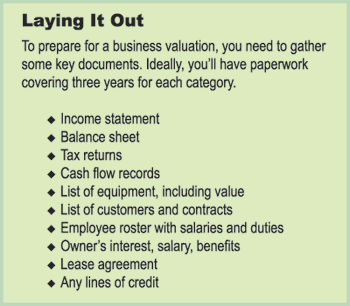How Much Is Your Business Worth?
Published Tuesday, November 4, 2008 at: 7:00 AM EST
 During the years you’ve spent building your business, you probably haven’t had much time to worry about how much it is worth. But at some point you may need to find out—if you consider selling the company, or you decide to give shares to your children and require an appraised value to gauge the worth of those shares for tax purposes. Other estate planning strategies may also call for putting a dollar value on the business, as could a pending divorce or other litigation. Whatever the reason, when the time comes, you shouldn’t try to go it alone.
During the years you’ve spent building your business, you probably haven’t had much time to worry about how much it is worth. But at some point you may need to find out—if you consider selling the company, or you decide to give shares to your children and require an appraised value to gauge the worth of those shares for tax purposes. Other estate planning strategies may also call for putting a dollar value on the business, as could a pending divorce or other litigation. Whatever the reason, when the time comes, you shouldn’t try to go it alone.
Taking a guess based on a multiple of earnings or another rule of thumb isn’t likely to be good enough when it comes to valuing what’s undoubtedly your largest asset. “The biggest mistake you can make is to do it yourself,” says Kevin Yeanoplos, chairman of the Accredited in Business Valuation Credential Committee for the American Institute of Certified Public Accountants.
Business valuation is a technical field requiring a broad range of knowledge, and experience matters a great deal, Yeanoplos says. Also, the value of your business may vary depending on the intended purpose of the valuation. In other words, the same business may have a different nominal value if you’re planning a sale, doing an estate plan, involved in litigation, or converting a business to another kind of entity—for example, from a privately held company to an employee stock ownership plan.
Some of the variation involves the difference between fair market value and investment value. The former refers to the value of an entity when a willing buyer and seller agree on a price with no compulsion on the part of either to exchange the item. Investment value, in contrast, may refer to a situation in which a specific buyer has a particular reason to want the entity. For instance, a company within the same industry looking to expand likely would pay a premium—an amount above the fair market value—for a similar business in a new area.
In the case of an ardent suitor, you could seek out a business valuation expert who specializes in business-to-business sales. On the other hand, if you need a valuation for calculating a divorce settlement, you’d need a valuation expert whose experience involves family law. Finding a valuation specialist who focuses on businesses in your industry or companies of a size similar to yours can also be helpful.
Choosing the right appraiser should also include considering credentials, such as the AICPA’s Accredited in Business Valuation (ABV) and the Accredited Senior Appraiser (ASA) credential from the American Society of Appraisers in Business Valuation. Such designations ensure specialization, education, and experience.
If you seek assistance in locating the right appraiser, call our office and we can help.
This article was written by a professional financial journalist for Preferred NY Financial Group,LLC and is not intended as legal or investment advice.
An individual retirement account (IRA) allows individuals to direct pretax incom, up to specific annual limits, toward retirements that can grow tax-deferred (no capital gains or dividend income is taxed). Individual taxpayers are allowed to contribute 100% of compensation up to a specified maximum dollar amount to their Tranditional IRA. Contributions to the Tranditional IRA may be tax-deductible depending on the taxpayer's income, tax-filling status and other factors. Taxed must be paid upon withdrawal of any deducted contributions plus earnings and on the earnings from your non-deducted contributions. Prior to age 59%, distributions may be taken for certain reasons without incurring a 10 percent penalty on earnings. None of the information in this document should be considered tax or legal advice. Please consult with your legal or tax advisor for more information concerning your individual situation.
Contributions to a Roth IRA are not tax deductible and these is no mandatory distribution age. All earnings and principal are tax free if rules and regulations are followed. Eligibility for a Roth account depends on income. Principal contributions can be withdrawn any time without penalty (subject to some minimal conditions).
© 2024 Advisor Products Inc. All Rights Reserved.

